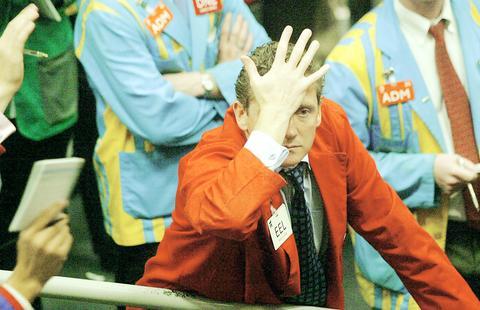US oil prices hit fresh record highs yesterday on nagging concerns over supplies from Russia and Iraq and doubts over OPEC's ability to make up for any shortfalls.
US light crude rallied to US$43.09 a barrel, the highest in the 21-year history of crude oil trade on the New York exchange, before easing to US$42.98, up US$0.23.
It closed US$0.15 lower on Thursday as Moscow backtracked on a threat to halt sales from Yukos, Russia's top oil producer.

PHOTO: AFP
In London, Brent crude jumped US$0.30 to US$39.55 a barrel, just off 14-year peaks, after settling US$0.28 lower.
Timothy Evans, an analyst at IFR Energy Services, said the market was still not convinced crude supplies from Yukos would flow indefinitely and was doubtful about Iraqi crude output.
"The company [Yukos] is still clearly financially strapped by the government's insistence that it pay its US$3.4 billion tax bill and pay it now," he said in a research note.
Yukos has said the company could collapse by the middle of next month because of a freeze on its bank accounts and assets, adding that its rail shipments of oil, which make up a quarter of its total sales, could be affected soon.
"The Yukos tax row has made buyers of Russian crude afraid to buy from Yukos," said David Thurtell, a commodity strategist at Commonwealth Bank of Australia.
The Iraqi oil minister said on Thursday the country's oil exports -- limited to its southern terminals due to sabotage and infrastructure defects -- would average between 1.7 million and 1.8 million barrels per day (bpd) next month, from 1.5 million this month.
Evans said the market was sceptical of Iraq's claim that it was producing a total of 2.4 million bpd.
"But with the ongoing violence there, the suspicion is that it [total output] could be 1.4 million bpd tomorrow, forget about 2.8 million bpd by year-end," he said.
Meantime, OPEC is pumping at more than 95 percent of capacity, the highest for a quarter of a century, and analysts said it had little room to boost output during emergencies. Saudi Arabia is seen as the only OPEC producer with any spare capacity.
Crude oil shipments from all 11 OPEC producers fell 560,000 bpd in the four-week period ending Aug. 7 as exports to the West slip from a peak this month.
This could largely be due to falling demand for sour crudes, an oil shipping analyst said.
The sky-rocketing price of oil has sparked concerns in Japan, which together with South Korea imports all its crude oil needs.
"Asian economies have been doing relatively well. But it [the rise in oil prices] is becoming a worrying factor," Vice Finance Minister for International Affairs Hiroshi Watanabe said.
Benchmark oil futures on the Tokyo Commodity Exchange continued their strong run yesterday after striking record contract highs a day earlier.
The IMF is more sanguine. IMF head Rodrigo Rato said the global economic recovery had gathered enough momentum to weather the effects of rising oil prices, which he said was caused by both economic and political factors.
Rato said he agreed with the Paris-based International Energy Agency that oil prices would stay higher than was expected "only a few months ago."

The CIA has a message for Chinese government officials worried about their place in Chinese President Xi Jinping’s (習近平) government: Come work with us. The agency released two Mandarin-language videos on social media on Thursday inviting disgruntled officials to contact the CIA. The recruitment videos posted on YouTube and X racked up more than 5 million views combined in their first day. The outreach comes as CIA Director John Ratcliffe has vowed to boost the agency’s use of intelligence from human sources and its focus on China, which has recently targeted US officials with its own espionage operations. The videos are “aimed at

STEADFAST FRIEND: The bills encourage increased Taiwan-US engagement and address China’s distortion of UN Resolution 2758 to isolate Taiwan internationally The Presidential Office yesterday thanked the US House of Representatives for unanimously passing two Taiwan-related bills highlighting its solid support for Taiwan’s democracy and global participation, and for deepening bilateral relations. One of the bills, the Taiwan Assurance Implementation Act, requires the US Department of State to periodically review its guidelines for engagement with Taiwan, and report to the US Congress on the guidelines and plans to lift self-imposed limitations on US-Taiwan engagement. The other bill is the Taiwan International Solidarity Act, which clarifies that UN Resolution 2758 does not address the issue of the representation of Taiwan or its people in

US Indo-Pacific Commander Admiral Samuel Paparo on Friday expressed concern over the rate at which China is diversifying its military exercises, the Financial Times (FT) reported on Saturday. “The rates of change on the depth and breadth of their exercises is the one non-linear effect that I’ve seen in the last year that wakes me up at night or keeps me up at night,” Paparo was quoted by FT as saying while attending the annual Sedona Forum at the McCain Institute in Arizona. Paparo also expressed concern over the speed with which China was expanding its military. While the US

SHIFT: Taiwan’s better-than-expected first-quarter GDP and signs of weakness in the US have driven global capital back to emerging markets, the central bank head said The central bank yesterday blamed market speculation for the steep rise in the local currency, and urged exporters and financial institutions to stay calm and stop panic sell-offs to avoid hurting their own profitability. The nation’s top monetary policymaker said that it would step in, if necessary, to maintain order and stability in the foreign exchange market. The remarks came as the NT dollar yesterday closed up NT$0.919 to NT$30.145 against the US dollar in Taipei trading, after rising as high as NT$29.59 in intraday trading. The local currency has surged 5.85 percent against the greenback over the past two sessions, central